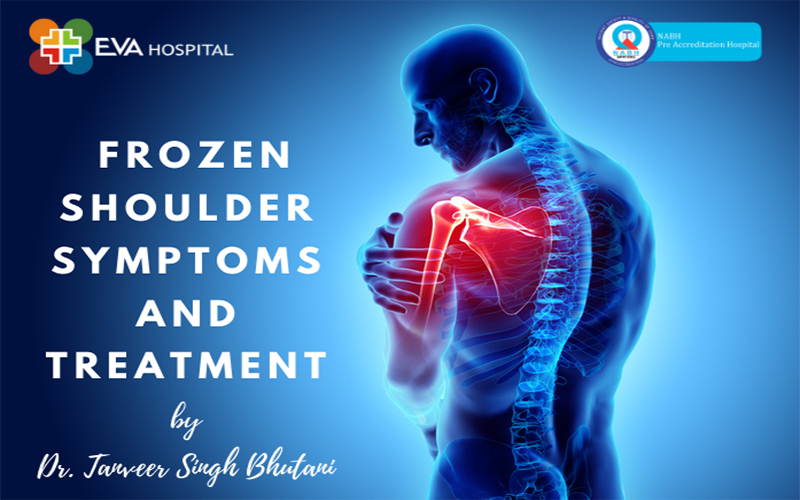Frozen A shoulder-up or stiff condition, is officially known as adhesive capsulitis, and it results in a lot of pain when movement is attempted. There are various frozen shoulder symptoms, and this condition can significantly impair your fundamental movements; thus, finding a cup or combing hair becomes almost impossible.
Eva Hospital’s Dr. Tanveer Bhutani, a prominent bone specialist in Ludhiana, designs personal treatment plans to help patients with the condition get their shoulder back and relieve their pain.
What is Frozen Shoulder?
Frozen shoulder occurs when the connective tissue surrounding the shoulder joint becomes inflamed and stiff, leading to restricted movement. This condition progresses in stages, starting with pain and eventually resulting in a “frozen” state where movement is almost impossible and sometimes your hear a sound of clicking while you move your shoulder.
Understanding the Anatomy of the Shoulder
The shoulder is a ball-and-socket joint, comprising the humerus, scapula, and clavicle. It is surrounded by a flexible capsule that allows a wide range of motion. In frozen shoulder, this capsule thickens and tightens, reducing its elasticity and causing pain.
Which Population is Most Vulnerable to Frozen Shoulder?
This disease affects some categories of patients more than others. Risk factors include diabetics, thyroid problems, patients in the course of recovery from shoulder surgery, or patients with skull injuries. Also, it targets women who are 40–60 years old, but it’s for anyone.
What Are the Symptoms of Frozen Shoulder?
Frozen shoulder also known as adhesive capsulitis is a medical complication whereby the shoulder capsule is inflamed, thickened and stiffened resulting in loss of movement and chronic pain. The progression of it may be quite slow, and might extend to several months or years without treatment. Early recognition is key to effective management, as identifying what are the symptoms of frozen shoulder allows patients to begin treatment sooner, improve range of motion, and reduce long-term complications. In most cases, patients complain of pain during rest, pain when they move, and being unable to do normal activities.
Early-Stage Indicators and Frozen Shoulder Signs and Symptoms
The most common symptom during the first stage (freezing) is pain. It usually begins as a soreness in the beginning of the shoulder joint and then can extend to the upper arm. The patients can observe the discomfort aggravates at night and impacts sleep quality. Together with the pain, a slow loss of the range of motion of the shoulder starts. These are the classic frozen shoulder signs and symptoms, which include difficulty lifting the arm overhead, reaching behind the back, or performing everyday tasks such as dressing or combing hair. The identification of these symptoms at an early stage can trigger treatment measures such as light stretches and non-inflammatory drugs.
Advanced Symptoms and Frozen Shoulder Symptoms and Cure
When the condition gets to the stage of being frozen, the shoulder becomes significantly stiff, and even the simplest movement is a struggle. It may be pain, but the most crippling of it may be stiffness, which may restrict day-to-day activity such as accessing shelves or driving. Treatment at this stage focuses on frozen shoulder symptoms and cure, which typically includes structured physiotherapy, range-of-motion exercises, and sometimes medical interventions such as corticosteroid injections or joint manipulation under anesthesia. It takes time to recover, though regular therapy can make individuals active again, and the pain can be significantly minimized.
Symptoms of Frozen Shoulder Pain in Daily Activities
During the last stage of treatment, the stage of thawing, the patients can observe a gradual reduction in the shoulder movement however, there can still be some pain affecting normal activities. The symptoms of frozen shoulder pain can affect sleep, self-care, work-related activities, and recreational movements. Patients complain of inability to raise things, reach above head or straighten the arm behind the back. The knowledge of these symptoms stimulates the attraction to rehabilitation exercise and lifestyle change, which are important to restore the full functioning and avoid recurrence.
Patients with Frozen Shoulder experience its stages through worsening symptoms that include painful stiffnes, although doctors treat this condition through physical therapy combined with potential surgical interventions.

Diagnosing Frozen Shoulder
In view of the foregoing, issues of diagnosis cannot be overemphasized, as they form the basis of requiring proper treatment. Dr. A physical examination is also accompanied by the assessment of medical history and CT, MRI, and X-ray scans, among which Tanveer Bhutani’s highest likely confirmation of the condition, minus other conditions, is a score of 72 percent.
What to Do About Frozen Shoulders?
Many situations do not need surgery, and it is possible to cure a condition known as the frozen shoulder naturally. Treatments include:
- Physical Therapy: Activities to enhance movement.
- Medications: pain relievers and medications that will lessen swollen or irritated tissue.
- Steroid Injections: To reduce inflammation within the shoulder joint, it is recommended to:
New Approaches to Treatment and Analysis from Dr. Tanveer Bhutani
Presently at Eva Hospital, intra-articular anatomy, Dr. Bhutani uses hydrodilatation, a procedure that reduces pain and swelling and helps to increase the volume of the joint capsule through the administration of fluids. It has been proved that such an approach yields relatively good results as far as the restoration of movement is concerned.
Most patients with pain and some degree of stiffness in the shoulder are confused to know whether they have adhesive capsulitis better referred to as frozen shoulder. The problem may be confusing and frustrating, and that is why it is essential to realize what the diagnosis is and how it is possible to treat and cure it as well as the period in which the condition can be overcome.
1. Limited motion in shoulders and shoulder’s pain treatment
Frozen shoulder begins with pain in the shoulder joint on raising hands so that most common things in a person like dressing, driving or even sleeping may not be comfortable in a person. Therapy aims at decreasing the swelling, as well as regaining shoulder range of motion. Dr. Tanveer Bhutani also focuses on unique physical therapy approaches and medication in Eva Hospital to help the patients.
2. Non surgical treatment of frozen shoulder.
Interestingly, most of the cases do not require surgical treatment and many people search, how to cure frozen shoulder without surgical operation. Dr. The method Bhutani proposes involves the use of a mix between manual therapy, guided exercises, and hydrodilatation a non-surgical measure that increases the ability of the joints to be flexible by injecting fluid into the shoulder capsule. The technique has been found to work very well in reducing the recovery time and easy pain.
3. Time Line of Adhesive Capsulitis Recovery
Patient expectations are important with regard to understanding the capsulitis timeline of recovery. The recovery process usually takes 6 months to 2 years with respect to the severity and response to treatment. The three identified phases include, freezing, frozen, and thawing, which come along with their symbols and period. Early detection and individual attention strongly contribute to the shorter periods of healing.
4. The Best Physical Therapy exercising involves Frozen Shoulder.
The most effective physical therapy in frozen shoulder is based on stretch exercises, correction of posture, and strengthening. Dr. Bhutani collaborates with the rehab experts of Eva Hospital in providing patients with an effective course of the progressive therapy plan that meets their range-of-motion objectives.
Overview of Frozen Shoulder (Adhesive Capsulitis)
| Stage | Symptoms | Duration | Treatment Approaches |
|---|---|---|---|
| Freezing Stage | Gradual onset of shoulder pain, increasing stiffness, limited motion | 6–12 weeks | Pain relievers, anti-inflammatory meds, gentle physical therapy |
| Frozen Stage | Stiffness becomes severe, pain may lessen, movement highly restricted | 4–6 months | Targeted physical therapy, hydrodilatation, steroid injections |
| Thawing Stage | Range of motion slowly improves, pain subsides | 6 months to 1 year | Strengthening exercises, continued therapy, monitoring for full recovery |
| Post-Recovery Phase | Full or near-full range of motion returns, minimal or no pain | Varies per patient | Maintenance exercises, posture correction, long-term joint health care |
Conclusion!
Frozen shoulder is a very incapacitating condition, but thanks to specialists Dr. Tanveer Bhutani of Eva Hospital, one can get well. Prostate cancer screening and, therefore, early diagnosis coupled with proper treatment can enhance quality of life. Do not allow ‘frozen shoulders’ to limit your movements; get treatment from a healthcare professional immediately.
FAQs About Frozen Shoulder
This includes: the early signs of frozen shoulder are usually not well defined and present themselves in phases, which include the freezing phase, the frozen phase, and the thawing phase. Symptoms that are apparent at this stage are normally mild pain and rigidity, especially when standing or walking.
Although it may progress to frozen shoulder with time, the condition, if not treated, will lead to prolonged pain and disability.
Recovery takes about 6 months years in average, depending on the type of treatment required.
Surgery is generally the last option suggested after treating a patient with other forms of treatment.
Indeed, specific exercises are beneficial for regaining mobility, as argued next.
Dr. Tanveer Bhutani offers personalized care and innovative treatments, ensuring optimal outcomes.


